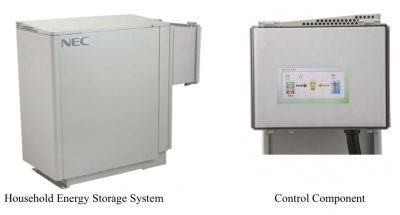Your support helps us to tell the story
From reproductive rights to climate change to Big Tech, The Independent is on the ground when the story is developing. Whether it's investigating the financials of Elon Musk's pro-Trump PAC or producing our latest documentary, 'The A Word', which shines a light on the American women fighting for reproductive rights, we know how important it is to parse out the facts from the messaging.
At such a critical moment in US history, we need reporters on the ground. Your donation allows us to keep sending journalists to speak to both sides of the story.
The Independent is trusted by Americans across the entire political spectrum. And unlike many other quality news outlets, we choose not to lock Americans out of our reporting and analysis with paywalls. We believe quality journalism should be available to everyone, paid for by those who can afford it.
Your support makes all the difference.A Japanese company has perfected the technology that will store green energy in the homes of the immediate future and control where and when that power is provided to the building.
Other firms are working on similar storage and control systems for individual homes, but Japanese companies have redoubled their efforts in the wake of the massive earthquake and tsunami that devastated the northeast of the country in March and destroyed the Fukushima Dai-Ichi nuclear plant.
Shorn of the energy produced at the facility, there is growing concern that major urban areas - primarily Tokyo - will experience blackouts when demand surpasses the amount that can be provided by other plants.
And with daytime temperatures that will rise above 30 degrees C as the summer begins to kick in, demand for power for air-conditioning units is already rising.
NEC Corporation has made a breakthrough with the launch of its household energy storage system, which is equipped with lithium-ion batteries and can simultaneously control electrical power throughout the home.
The first 100 units of this industry first will be made available to home construction companies and businesses from July 18, NEC said.
The system automatically controls power to the building by connecting to the distribution panel and enabling interactive coordination with the power supplied by a commercial energy company and the home's electrical devices, its solar power systems and other equipment.
"This interactivity enables the system to store power during nighttime hours, when power consumption is low, then to use the stored power during afternoon hours, when power consumption reaches its peak," NEC said.
"This reduces both the demand on power companies as well as household electricity charges.
"Recently, in consideration of the supply and demand conditions for electricity during summer in Japan, initiatives to shift the peak afternoon power consumption time and reduce the overall volume of power consumption are steadily advancing.
"Furthermore, households have become increasingly aware of the importance of access to electricity for essential needs in the event of an emergency or blackout, in addition to the necessity of power conservation," it said.
Panasonic Corp. is working on similar technology and operates a model home of the future in Tokyo where it showcases cutting-edge technology that will make homes in the future greener and more energy efficient.
The model home incorporates solar panels, pipes that carry hot water beneath the floor in the winter and cool water in the summer and reduced-energy lighting.
Until now, however, the largest obstacle to such systems being introduced on a large scale to homes has been the lack of a reliable storage system for the energy that is generated, a problem that NEC appears to have overcome.
JR

Join our commenting forum
Join thought-provoking conversations, follow other Independent readers and see their replies
Comments